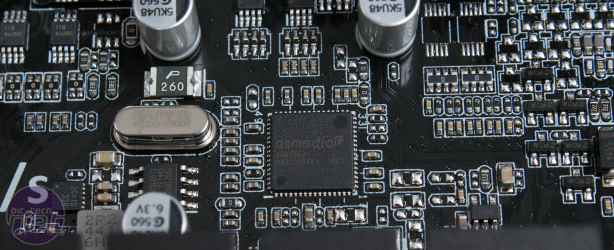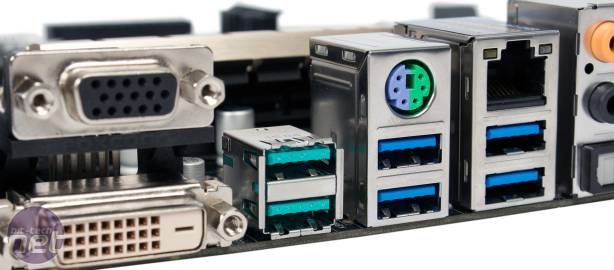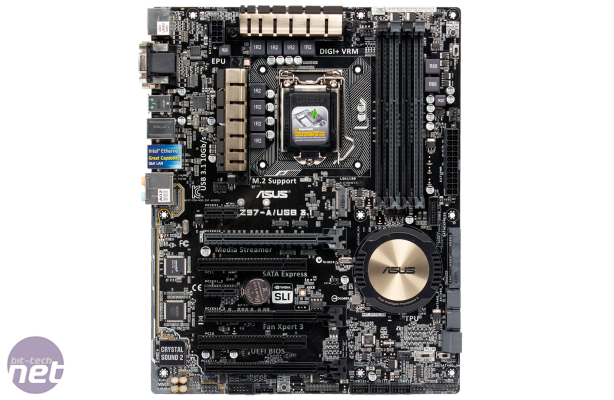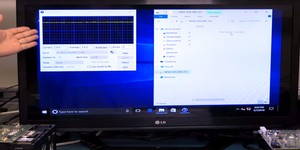
Performance Analysis
The first thing to note is something that surprised us; your system power settings can have a dramatic impact on current USB 3.1 performance. We first tested with the motherboard BIOS at its optimised default settings, and thus with the various CPU power saving features enabled. However, we got results that were inconsistent with what was expected based on Asus's own testing, with results capping out at 625MB/sec (not bad, but a long way off the promised 800MB/sec and more). However, after consulting with Asus, we then disabled Enhanced Intel SpeedStep (EIST) and all C-States in the BIOS, and set the Windows power profile to High Performance for good measure. This allowed us to produce the results you see on the previous page. We have no information as to why this is, but it appears that lower power states adversely affect the performance of the ASMedia controllers, at least with the current drivers.As we mentioned, we've left the results we achieved with MSI's hardware out of the graphs. For these tests with Asus, we are using hardware with the same controllers, and the same OS and tests, but on a different platform (X99 vs Z97) with a different PCB and different SSDs making up the test device too. Both devices should still be enough to throttle the USB 3.1 interface, or at least give it a real running, so we will still make some rough comparisons below. C-States were disabled when testing on the MSI motherboard, with everything else left at default.
With that out the way, it's hard not to be impressed with the numbers. Sequential performance hovers at around 770MB/sec for reads and writes in both CrystalDiskMark and ATTO, with the latter test showing an 88 percent boost over USB 3.0 and CrystalDiskMark actually doubling entirely for write speeds.
Asus's Turbo mode adds some performance in these tests too, albeit only 2-3 percent, though this is just about enough for it to push past the 800MB/sec mark for sequential writes in CrystalDiskMark. This is almost 300MB/sec quicker than what we saw with MSI, it's 150MB/sec or so faster on read speeds too.
Random performance is up on USB 3.0 by almost 60 percent on reads, dropping to 46 percent at QD32. However, the star of the show is random write performance, which jumps up by a whopping 220 percent. Clearly, there have been some optimisations for these sorts of workloads in USB 3.1. Asus's Turbo mode made no difference to the results (they actually dropped slightly), but it still has a fair margin over MSI.
Transferring a single large video file to the USB 3.1 Enclosure went up from 298MB/sec via USB 3.0 to 472MB/sec (a 58 percent boost). Turbo mode adds an extra 5 percent to the results, which takes the read speeds to above 500MB/sec. Comparisons to MSI are even shakier for these tests, as the speeds are derived from manual timings, with Antony testing MSI and Matt testing Asus on different days. Nonetheless, MSI is actually slightly ahead on read speeds, whereas Asus takes the lead with writes.
For the directory of small files, USB 3.1 is 43 percent quicker than USB 3.0 for writes (235MB/sec compared to 164MB/sec) and 22 percent for reads. Turbo mode is no help here, just with random performanec in the synthetic benchmarks. Compared to MSI, Asus has a clear advantage here again, particularly with write speeds.
While Asus's USB 3.1 Boost software appears to have little impact in our tests, Asus explains that this is due to us using Windows 8/8.1 in our tests. The Turbo mode enabled for these tests is entirely software based, and for these versions of Windows Asus says its optimisations only allow it to boost performance by 3-5 percent, which is in line with what we saw. However, it says there is much more room for improvement in Windows 7 (which doesn't even have native USB 3.0 support), claiming increases of 35-40 percent.
Conclusion
As we saw with MSI, the switch from USB 3.0 to USB 3.1 is not as massive a boost as it was from USB 2.0 to USB 3.0. There are certainly some impressive figures here though, especially in the synthetic tests, but from the file transfer tests it looks like the most you'll see is closer to 50 percent, with less improvement if you're transferring multiple files of various sizes all at once. The exception to this is random write performance, which has really been unleashed. However, this type of workload is (typically) less important than sequential performance for USB-attached storage, unless you're looking to run portable operating systems.It's a promising technology, and certainly one we want to see adopted as quickly as possible (faster is faster, after all). However, it will take a long time before widespread adoption, e.g. native ports in chipsets, native OS drivers, and plenty of hardware that uses and takes advantage of the protocol. Nevertheless, the fact that we're seeing motherboard manufacturers start to implement on-board ports and add-on cards is of course a good first step.
With retail products ready to go and faster speeds, Asus does have the more complete USB 3.1 solution at present; even without Turbo it's capable of much higher speeds than we saw with MSI. Admittedly, the highest gains are in the synthetic tests, but it shows it in the file transfers too. Exactly what this is down to is hard to say, though Asus says it has worked closely with ASMedia to examine USB 3.1 data transmission on both the host and device sides. Nevertheless, it will certainly be interesting to see how varied USB 3.1 solutions are in performance terms when there's a full range on the market, which should be within the next few months.

MSI MPG Velox 100R Chassis Review
October 14 2021 | 15:04











Want to comment? Please log in.
Posted by maverik-sg1 - Fri Feb 20 2015 09:17
The tech is unreliable (perhaps better on new boards?), but also I expected by now all ports on boards would be USB3, devices should be good value and this is simply not the case.
So now we get 3.1 which will add more sockets to the board with more connectors, at a time when even mobile chargers for anything that's not an Apple device are standardised I find the whole thing unacceptably confusing.
Posted by SchizoFrog - Fri Feb 20 2015 09:38